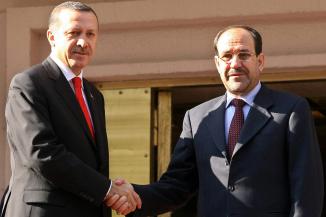 Aside from the ongoing drama between the PKK and the Turkish military, a great deal of Turkey's most recent foreign affairs activity has been tied to its potential accession to the European Union (EU). Most observers of Turkey derive the majority of their analysis of Turkey's potential EU membership from the stoic proclamations of President Gul or the anti-Turkish rhetoric of President Sarkozy. However, an additional angle from which one can develop further understanding of the EU issue is by exploring the perspective of Turkey's traditional foes, Greece and Armenia.
Aside from the ongoing drama between the PKK and the Turkish military, a great deal of Turkey's most recent foreign affairs activity has been tied to its potential accession to the European Union (EU). Most observers of Turkey derive the majority of their analysis of Turkey's potential EU membership from the stoic proclamations of President Gul or the anti-Turkish rhetoric of President Sarkozy. However, an additional angle from which one can develop further understanding of the EU issue is by exploring the perspective of Turkey's traditional foes, Greece and Armenia.This past week featured Turkish Foreign Minister Ali Babacan and Greek Foreign Minister Theodora Bakoyianni exchanging incredibly sugar-coated words concerning Turkey's EU candidacy and also on the general subject of relations between their two countries. With Greece wholly behind Turkey's EU bid, Turkey has gained a very valuable source of support given the fact that the relations between the two countries have been historically sour at best.
Some observers consider Greece's strong support for Turkey's bid as somewhat inevitable given the growing amount of humanitarian cooperation between the two countries since they were struck by the same earthquake several years ago. Cross-border investment is growing in both directions and young Turks certainly do not harbor the same acrimonious feelings about Greece that their grandparents possess. The recent inauguration of a gas pipeline between Greece and Turkey to serve European markets further highlights the growing strategic connections.
 There is no question that the positive momentum that increasingly characterizes the relations of Turkey and Greece is real. While Turkey's motivations are clear, it is nevertheless important to take a closer look at why Greece has chosen to extend its support. To understand Greece's motivations in greater depth (and beyond their interest in seeing the Cyprus issue resolved at some point during this century), it is helpful to jump to Armenia in order to consult that nation's conversation concerning Turkey and the EU. Whether due to the historical issue of the Armenian Genocide or the ongoing Turkish (and Azerbaijani) economic blockade, Armenia's affairs and future are very much tied to those of Turkey.
There is no question that the positive momentum that increasingly characterizes the relations of Turkey and Greece is real. While Turkey's motivations are clear, it is nevertheless important to take a closer look at why Greece has chosen to extend its support. To understand Greece's motivations in greater depth (and beyond their interest in seeing the Cyprus issue resolved at some point during this century), it is helpful to jump to Armenia in order to consult that nation's conversation concerning Turkey and the EU. Whether due to the historical issue of the Armenian Genocide or the ongoing Turkish (and Azerbaijani) economic blockade, Armenia's affairs and future are very much tied to those of Turkey.While largely unnoticed by the Turkish media, there is a heated debate between Armenia's long-time former president, Levon Ter-Petrossian, and the current president, Robert Kocharian, concerning Turkey's future in Europe. While both are interested in greater normalization of ties with Turkey, Ter-Petrossian is much more aggressive about pursuing cooperation and dialog. Concerning Turkey's candidacy for the EU, Ter-Petrossian's views are quite logical as exhibited in the following article from armenialiberty.org.
“Isn’t it obvious that Turkey’s membership in the EU is beneficial for Armenia in the economic, political and security terms? he added. "What is more dangerous: an EU member Turkey or a Turkey rejected by the West and oriented to the East?
“Or what is more preferable? An Armenia isolated from the West or an Armenia bordering the EU? Our country’s foreign policy should have clearly answered these questions a long time ago.”
 Ter-Petrossian's comments are just as applicable to Armenia as they are to understanding Greece's interest in Turkey becoming a member of the EU. In addition to the regional economic benefits of Turkey joining the EU, both Armenia and Greece are very aware of the value of the horse-and-carrot strategy that the EU has used to prompt Turkey to pursue internal changes. This EU strategy has been implemented in order to force stubborn Turkey to pursue a path that is complimentary to the Western European system of political, economic and social values. Most Turks, in turn, have become embittered by what they see as a series of false promises, which have provoked a dizzying contortion of Turkey's identity. Both Greece and Armenia could not be more pleased by this painful process and will rue the day that Turkey is no longer tempted to join the European fraternity.
Ter-Petrossian's comments are just as applicable to Armenia as they are to understanding Greece's interest in Turkey becoming a member of the EU. In addition to the regional economic benefits of Turkey joining the EU, both Armenia and Greece are very aware of the value of the horse-and-carrot strategy that the EU has used to prompt Turkey to pursue internal changes. This EU strategy has been implemented in order to force stubborn Turkey to pursue a path that is complimentary to the Western European system of political, economic and social values. Most Turks, in turn, have become embittered by what they see as a series of false promises, which have provoked a dizzying contortion of Turkey's identity. Both Greece and Armenia could not be more pleased by this painful process and will rue the day that Turkey is no longer tempted to join the European fraternity.It is of course irrelevant to either Greece or Armenia whether joining the EU is truly the best direction for Turkey. Both nations realize that Turkey would pose a bigger threat to their interests today if Turkey had not been under the EU microscope for roughly the past decade. As long as it continues to seek entrance, the EU will increasingly deny Turkey's ability to pursue its traditional agendas. It therefore appears likely that Greece and Armenia are hoping to use Brussels as the means for realizing their own historic interests vis a vis their greatest rival.








































